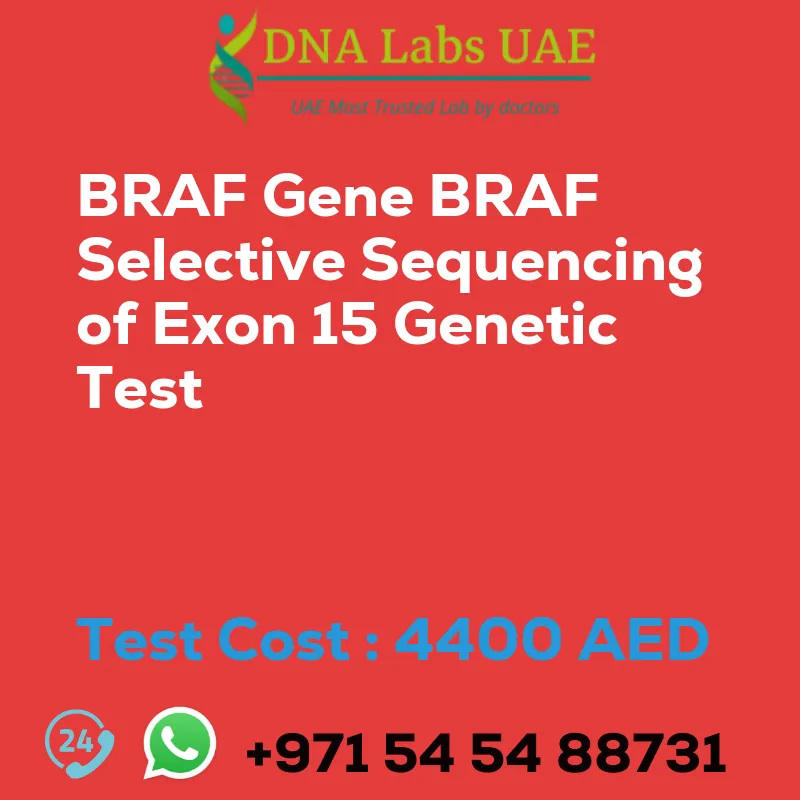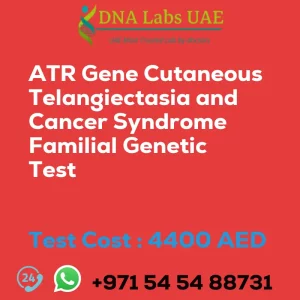BRAF Gene BRAF Selective Sequencing of Exon 15 Genetic Test
Test Name: BRAF Gene BRAF Selective Sequencing of Exon 15 Genetic Test
Components: Price: 4400.0 AED
Sample Condition: Blood or Extracted DNA or One drop Blood on FTA Card
Report Delivery: 3 to 4 Weeks
Method: NGS Technology
Test Type: Cancer
Doctor: Oncologist
Test Department: Genetics
Pre Test Information: Clinical History of Patient who is going for BRAF Gene BRAF Selective Sequencing of Exon 15 NGS Genetic DNA Test. A Genetic Counselling session to draw a pedigree chart of family members affected with BRAF Gene BRAF Selective Sequencing of Exon 15 NGS Genetic DNA Test gene BRAF
Test Details:
The BRAF gene is a gene that encodes for a protein called B-Raf, which is involved in cell signaling pathways. Mutations in the BRAF gene have been associated with various types of cancer, including melanoma, colorectal cancer, and thyroid cancer.
Selective sequencing of exon 15 of the BRAF gene refers to a genetic test that focuses specifically on sequencing the 15th exon of the gene. Exons are the coding regions of genes that contain the instructions for making proteins. By selectively sequencing exon 15, this test aims to identify any specific mutations or variations in that region of the BRAF gene.
Next-generation sequencing (NGS) is a high-throughput DNA sequencing technology that allows for the simultaneous sequencing of multiple genes or regions of interest. In the context of the BRAF gene, NGS can be used to analyze multiple exons or regions of the gene simultaneously, including exon 15.
The purpose of performing a selective sequencing of exon 15 of the BRAF gene using NGS is to identify any mutations or variations in that specific region that may be associated with cancer or other diseases. This information can be useful for diagnosis, prognosis, and treatment decisions for patients with cancer, as specific BRAF mutations can be targeted with certain therapies.
Overall, the BRAF gene BRAF selective sequencing of exon 15 NGS genetic test is a molecular diagnostic tool used to analyze a specific region of the BRAF gene for mutations or variations, with the goal of informing clinical decision-making in the context of cancer management.
| Test Name | BRAF Gene BRAF selective sequencing of exon 15 Genetic Test |
|---|---|
| Components | |
| Price | 4400.0 AED |
| Sample Condition | Blood or Extracted DNA or One drop Blood on FTA Card |
| Report Delivery | 3 to 4 Weeks |
| Method | NGS Technology |
| Test type | Cancer |
| Doctor | Oncologist |
| Test Department: | Genetics |
| Pre Test Information | Clinical History of Patient who is going for BRAF Gene BRAF, selective sequencing of exon 15 NGS Genetic DNA Test. A Genetic Counselling session to draw a pedigree chart of family members affected with BRAF Gene BRAF, selective sequencing of exon 15 NGS Genetic DNA Test gene BRAF |
| Test Details |
The BRAF gene is a gene that encodes for a protein called B-Raf, which is involved in cell signaling pathways. Mutations in the BRAF gene have been associated with various types of cancer, including melanoma, colorectal cancer, and thyroid cancer. Selective sequencing of exon 15 of the BRAF gene refers to a genetic test that focuses specifically on sequencing the 15th exon of the gene. Exons are the coding regions of genes that contain the instructions for making proteins. By selectively sequencing exon 15, this test aims to identify any specific mutations or variations in that region of the BRAF gene. Next-generation sequencing (NGS) is a high-throughput DNA sequencing technology that allows for the simultaneous sequencing of multiple genes or regions of interest. In the context of the BRAF gene, NGS can be used to analyze multiple exons or regions of the gene simultaneously, including exon 15. The purpose of performing a selective sequencing of exon 15 of the BRAF gene using NGS is to identify any mutations or variations in that specific region that may be associated with cancer or other diseases. This information can be useful for diagnosis, prognosis, and treatment decisions for patients with cancer, as specific BRAF mutations can be targeted with certain therapies. Overall, the BRAF gene BRAF selective sequencing of exon 15 NGS genetic test is a molecular diagnostic tool used to analyze a specific region of the BRAF gene for mutations or variations, with the goal of informing clinical decision-making in the context of cancer management. |








